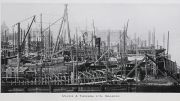Mackie and Thomson

of Govan Shipbuilding Yard, Govan, Glasgow
1888 Company established.
1891 Highland Lassie, delivered by Mackie and Thomson, Glasgow, in March 1891
1892 The Olivebank was built in 1892 at the Scottish Yard of Mackie and Thomson. She is a steel four-masted barque of 2,824 gross tons and is 326 feet long with a breadth of 43.1 feet and a depth of 24.5 feet. The ship was built for Andrew Weir and Co.,
1894 Mackie and Thomson built the three-masted full-rigged ship Aggi in 1894 at Glasgow, Scotland. This steel-hulled vessel was originally christened Seerose, which was later changed to Sant’ Erasmo, then renamed Apise. At the time of loss, Aggi was owned by the Norwegian firm of B.A. Olsen and Son.
1896 The steamer Duchess (official number 10872) was built in steel by Mackie and Thomson, Govan, Glasgow in 1896. She measured 40.7x7.9m, with a gross tonnage of 308, and had two funnels.
1907 Mackie and Thomson Limited was incorporated as a private company, with capital of £20,000.[1]
1909 Moray View Official Number 127511. Material Steel. Built for D. Main of Hopeman. Built by Mackie and Thomson of Govan in 1909. Dimensions 86.4' x 18.5' x 8.8'. Tonnage 93 gross tons, 36 net tons, 39 nominal horse power. Engine 18 inch compound (Lidgerwood and Co of Glasgow). Later owners 1927, to Wm Smith of Burghead; 1945, to Joseph Buchan of Peterhead as PD 235. Final fate: scrapped in about 1951.
1911 Harland and Wolff acquired the London and Glasgow Iron Shipbuilding Co's shipyard, together with the adjoining yard of Mackie and Thomson, and Robert Napier and Sons' old yard, which had been vacated by William Beardmore and Co.
1914 Iron and steel shipbuilders. Specialities: fishing vessels, cargo and passenger vessels up to 5,000 tons. Employees 500 to 600. [2]
See Also
Sources of Information
- ↑ The Scotsman 25 May 1907
- ↑ 1914 Whitakers Red Book
- L. A. Ritchie, The Shipbuilding Industry: A Guide to Historical Records (1992)
- Fred M. Walker, Song of the Clyde: A History of Clyde Shipbuilding (2001)

